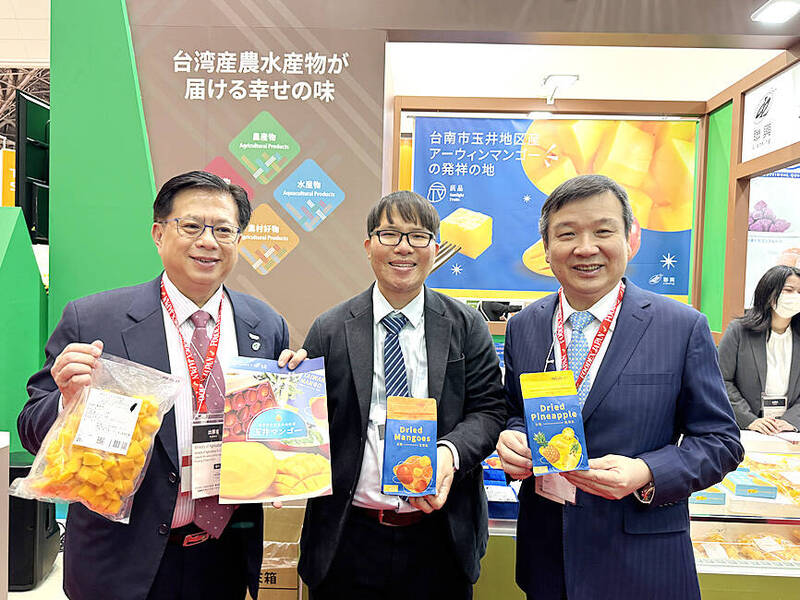《TAIPEI TIMES》 Japan key market for Taiwan’s agricultural exports: ministry - 焦點 - 自由時報電子報

Representative to Japan Lee Yi-yang, right, and Deputy Minister of Agriculture Huang Chao-ching, left, accompanied by a business representative, display Taiwan’s mango and pineapple products at a booth on the opening day of Foodex Japan in Tokyo yesterday. Photo: CNA
2025/03/12 03:00
/ Staff writer, with CNA
Japan was one of the top three destinations for Taiwanese agricultural exports for the past three years, the Ministry of Agriculture said yesterday at the opening of Foodex Japan, Asia’s largest food trade show.
Ministry data showed that key exports to Japan from 2022 to last year included frozen tuna, orchids and other live flowers, as well as feathers and down.
Frozen tuna shipments to Japan consistently accounted for more than half of Taiwan’s annual tuna exports during that period, while orchids and live flowers made up 14 to 18.4 percent, and feathers and down ranged from 5.6 to 17.7 percent, the ministry said.
Conversely, Taiwan’s top agricultural imports from Japan over the past three years included fresh chilled beef, which accounted for 9.4 to 13.1 percent of the nation’s total beef imports.
In addition, Japanese alcoholic beverages ranked among Taiwan’s top imports in 2022, accounting for 9.5 percent of total imports in that category, the ministry said.
Last year, fresh chilled apples ranked ninth among Taiwan’s agricultural imports, with Japan accounting for 23.9 percent of total apple imports, after the US and New Zealand.
Taiwan’s agricultural exports to Japan totaled US$856 million in 2022, representing 16.3 percent of overall agricultural exports and marking an 11 percent annual increase.
However, in 2023, exports declined 16 percent to US$719 million, accounting for 14.7 percent of total exports.
Last year, Japan ranked as Taiwan’s third-largest agricultural export market, with exports falling 10 percent to US$648 million, behind the US with US$887 million, or 18 percent, and China, with US$747 million, or 15.2 percent, ministry data showed.
The ministry attributed the decline to global inflation, rising interest rates and the depreciation of the yen, adding that higher global grain prices also constrained Japan’s overall import capacity.
新聞來源:TAIPEI TIMES
